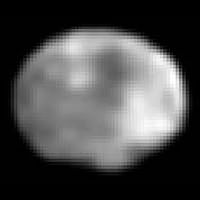
The Bad Astronomer, Planetary Society Blog, and NASAWatch are reporting that NASA has cancelled the Dawn mission to Ceres and Vesta, two very large and very different asteroids.
Ceres has a spectrum like that of a primitive carbonaceous chondrite meteorite--a body consisting of carbon, water (usually bound up in minterals), and the round frozen droplets of high-temperature refractory minerals known as chondrites--essentially, the solar nebula as it was 4.6 billion years ago.
Vesta though, has a spectrum like that of common basaltic lava. It's brighter, more reflective, and meteorites that appear to come from the Vesta group of asteroids are distinctly igneous in nature. Vesta is likely an asteroid that underwent the process of differentiation, where iron-like (siderophile) elements separated and sank to the core of the proto-body and lighter elements floated to a crust wracked by volcanic processes, despite being smaller than Ceres.
In the meteorites that fall to Earth, we see this sort of heterogenity that is apparent from the different asteroids. Iron meteorites are the cores of processed asteroids like Vesta. Rare carbonaceous chondrites are the more primitive objects in the solar system. Other types show the igneous surfaces, and some even show the mix of the core and crust of Vesta--chunks of green olivine floating in a matrix of iron-nickel.
The Dawn satellite is complete and ready to launch, and it's a shame that we can't because of little bit of cost-cutting. The price of the mission is less than a day in Iraq.
(image source: HST)
1 comment:
They're cancelling the launch probe they've already-built? That's insane!
Post a Comment